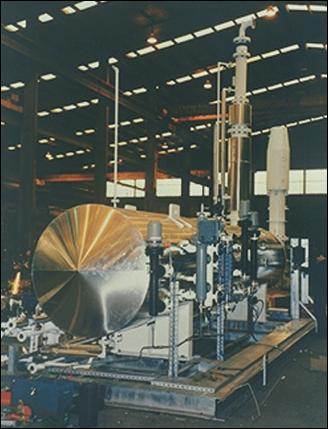
- (03) 5909 8218
- enquiry@fusionweld.com.au
Glycol Regeneration Units - Manufacturing to Optimise Natural Gas Processing
March 21, 2024

Optimise natural gas processing with Glycol Regeneration Units from Fusion-Weld Engineering. Enhance efficiency and purity in gas manufacturing today!
To transform raw natural gas into a clean, safe, and usable energy source, plant owners must invest in Glycol Regeneration Units. These units are central to the dehydration process of natural gas, preventing pipeline corrosion and freezing. They can also significantly enhance the efficiency and effectiveness of natural gas processing.
Dehydration in Natural Gas Processing
Water content in natural gas poses significant challenges, including pipeline corrosion and hydrate formation, which can lead to blockages and operational inefficiencies. Dehydration, therefore, is not just a step in processing but is a necessity for the safe transportation and efficient use of natural gas.
The dehydration process can be done by Glycol Regeneration Units. They employ a simple yet efficient process of removing water from natural gas. This process involves the use of a glycol solution, typically diethylene glycol (DEG) or triethylene glycol (TEG), which is often known for its high affinity for water.
When carrying out this process, multiple steps are taken. These include the following.
• Absorption: Raw natural gas is passed through a contactor tower, where it comes into direct contact with the glycol solution. The glycol then absorbs water vapour from the gas.
• Regeneration: The water-laden glycol is subsequently heated in a regeneration column, which removes the absorbed water, regenerating the glycol for reuse.
• Cooling and Recycling: After regeneration, the glycol is cooled and recycled back into the absorber to continue the dehydration process. This continuous loop allows for efficient dehydration of natural gas, ensuring the gas meets the required specifications for moisture content before it is transported or stored.
Glycol Generation Units: Main Benefits
The implementation of Glycol Regeneration Units in natural gas processing plants offers numerous benefits. First, they allow for the continuous dehydration of natural gas, which then increases the processing efficiency and throughput of natural gas plants. Next, they ensure that the processed natural gas is of high quality as they remove water vapour effectively, meeting industry standards and reducing the risk of pipeline issues.
Glycol Regeneration Units can likewise minimise the need for constant replenishment, reducing operational costs associated with the dehydration process. Ultimately, they minimise emissions and environmental impact, helping facilities comply with environmental regulations.
Despite these benefits, these units still face issues like glycol losses and contamination. However, with advanced designs and operational strategies like the use of lean glycol purification systems and meticulous maintenance routines, plant owners can easily mitigate these issues, ensuring their long-term efficiency and reliability.
Working with Fusion-Weld Engineering
Glycol Regeneration Units, which can be manufactured and designed by Fusion-Weld Engineering, are useful tools in the natural gas processing industry as they provide an effective solution for the dehydration of natural gas. By enhancing the efficiency, quality, and safety of natural gas processing, they can easily meet the global demand for clean and reliable energy. As the industry evolves, optimising these units through technological advancements and operational excellence can ensure they remain central to the natural gas processing infrastructure.
Contact Details
Fusion - Weld Engineering Pty Ltd
ABN 98 068 987619
1865 Frankston Flinders Road,
Hastings, VIC 3915
Ph: (03) 5909 8218
Optimized by NetwizardSEO.com.au
Recent Posts
- Pressure Vessel Inspection: Maintaining Critical Water Heating Infrastructure
- Scheduling Periodic Laundry Boiler Inspections: Best Practices for Plant Managers
- Glycol Regeneration Units - Manufacturing to Optimise Natural Gas Processing
- Skid Mounted Systems for Oil and Gas Industries: Achieve Mobility and Flexibility
- The Role of Transportable Pressure Vessel Inspections in Ensuring Safety
- Periodic Tank In-Service Inspection: How It Maintains Bulk Storage Tank Integrity
- Static Pressure Vessel Manufacturing: Achieve Maximum Reliability
- Pressure Equipment Management by Fusion-Weld: Key Role in Industrial Safety
- Pressure Piping System Inspection: A Gift of Safety for the Holidays
- Deaerator Inspections by Fusion-Weld Engineering and How They Reduce System Downtime
- Bulk Storage Tank Inspection: Protecting Your Essential Assets
- Pipe Spooling Design and Manufacture: Ensuring Accuracy and Fit
Posts 2023
- Pressure Piping System Inspection: A Gift of Safety for the Holidays
- Deaerator Inspections by Fusion-Weld Engineering and How They Reduce System Downtime
- View all articles…
Posts 2022
- How Fusion Weld Keeps Up With AS-NZS ISO 9001:2008 Standard
- Boiler Equipment Safety Inspection During the Summer Season
- View all articles…
Posts 2021
- Avoid These Factors and Practices that Contribute to Sealing Damage in Pressure Vessels
- Do's And Don'ts Of Industrial Boiler Inspection And Maintenance From Fusion-Weld
- View all articles…
Posts 2020
- What are the Risks and Hazards Involved in Pressure Vessel Equipment?
- How to Know if Your Pressure Equipment Needs Repair or Replacement?
- View all articles…
Posts 2019
- Factors that Contribute to Pressure Vessel Failure
- Pressure Vessel Regulations in Australia: What are the Mandatory Requirements?
- View all articles…
Posts 2018
- Pros and Cons of Spherical vs. Cylindrical Pressure Vessels
- What are the Different Hazard Levels in Pressure Vessels?
- View all articles…
Posts 2017
- Transportable Pressure Vessels: The Importance of Inspection and Safety Checks
- Fracture Mechanics and Stress Analysis of Cracks in Pressure Vessels
- View all articles…
Posts 2016
Posts 2015
- What Are Deaerators & Feedwater Vessels?
- Precautions and Safety for Compressed Air Receiver Vessels
- View all articles…
Posts 2014
- Demonstrating In-process Inspection Procedures
- Static Grounding Practices and Standards
- View all articles…